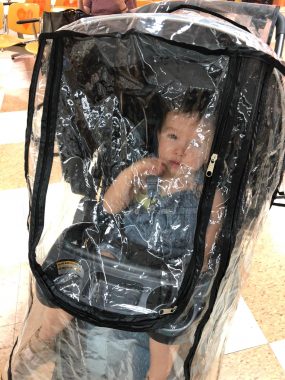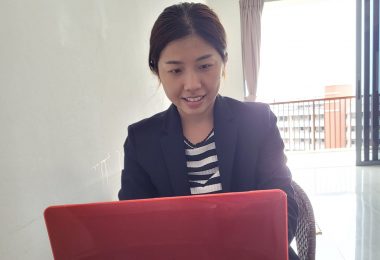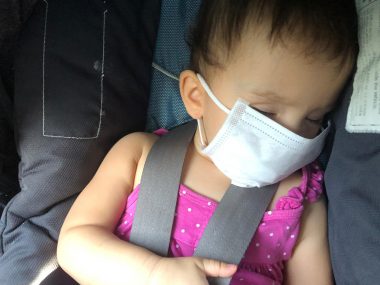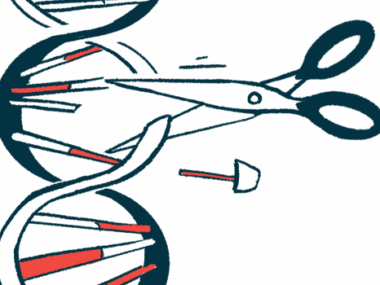Finding a Doctor Who Has Experience With AADC Deficiency Isn’t Easy
Written by |

We have seen several doctors in various countries in order to provide our daughter, Rylae-Ann, with the best healthcare and most beneficial checkups. We have settled on two doctors, and are always open to seeing others, but we’re learning that it isn’t uncommon to find doctors who are unwilling to treat us.
We have discovered that rare disease patients often go from doctor to doctor for years searching for answers.
Experience limited

Rylae-Ann is protected in her stroller behind a plastic shield while traveling to meet doctors abroad. (Courtesy of Richard E. Poulin III)
The aromatic l-amino acid decarboxylase (AADC) deficiency community is scattered around the world. With just over 100 confirmed cases worldwide, no doctor has extensive hands-on experience. The ones that do have experience have only seen a handful of cases.
Most doctors must connect with others, or read available AADC research documents. This can work, but each child is unique and some have several challenges. Interestingly, this also creates a novel scenario where patients in the rare disease community may have more knowledge about their condition than doctors do.
Unwilling to treat
After moving from Singapore to Thailand, we approached a doctor who had been recommended in online forums because she had experience with neurotransmitter diseases. But the doctor declined to see us and referred us to another specialist.
I wasn’t upset; I appreciated the doctor being direct with us. There is no point in wasting time if a doctor doesn’t feel comfortable, or doesn’t have time to research a patient’s particular challenges.
But during our discussion with our rare disease group, I was stunned to hear how many others had the same problem. I just assumed that doctors would treat someone who visited them. But after hearing what everybody had to say, I was able to see why some doctors would be reluctant.
A doctor might worry about a malpractice complaint, or the consequences of not providing satisfactory treatment. These fears could make a doctor timid and reluctant to provide proactive care.
Teleconferencing with doctors

Richard’s wife, Judy, teleconferences with a doctor in Singapore after the family’s move to Thailand. (Courtesy of Richard E. Poulin III)
It’s never good for anyone to have trouble finding a doctor, but this can be more serious for an AADC-deficient child because of the risks of infection and aspiration.
While we were still searching for answers, I consulted with an online doctor through a popular website. The experience was pleasant and affordable, but the doctor had no information to provide, and I haven’t considered that option again since.
However, the COVID-19 pandemic has made telehealth consultations more common, and services have improved. More doctors are now available online to meet the growing demand.
Ultimately, we decided to reach out to our previous doctor, a neurologist, in Singapore who had experience with two other cases. She was always considerate and caring during our appointments, or when Rylae-Ann had to be admitted into intensive care. She took time to visit Rylae-Ann and consult with the doctors in the ward to make sure they understood her rare condition. We were sorry to say goodbye to her when we left Singapore, but were delighted that we were able to reconnect.
Since then, we have arranged to teleconference with her regularly. We still see a neurologist locally, but we consult with the one in Singapore before we agree to any significant changes. This has been a better experience for Rylae-Ann. She is not as anxious, and that makes it easier for the doctor to observe her as part of the telemedicine appointment. And not having to travel to an appointment helps Rylae-Ann, too, because in-person visits often leave her exhausted and more susceptible to an oculogyric crisis.
Finding a doctor with AADC experience

Rylae-Ann rests after an exhausting routine visit to the doctor’s office. (Courtesy of Richard E. Poulin III)
Although a list is not available publicly yet, the AADC Family Network and the AADC Research Trust communities share their doctors’ networks. The Genetic and Rare Diseases Information Center also provides resources for finding a rare disease specialist, many of whom would be able to provide excellent advice for the AADC community as well. While payment for non-U.S. bank account holders can be cumbersome, the AADC family support networks can help international families arrange payment.
As we work to improve awareness about AADC and advance potential treatments, or even a cure, the database of doctors will grow.
***
Note: AADC News is strictly a news and information website about the disease. It does not provide medical advice, diagnosis, or treatment. This content is not intended to be a substitute for professional medical advice, diagnosis, or treatment. Always seek the advice of your physician or other qualified health provider with any questions you may have regarding a medical condition. Never disregard professional medical advice or delay in seeking it because of something you have read on this website. The opinions expressed in this column are not those of AADC News or its parent company, Bionews, and are intended to spark discussion about issues pertaining to aromatic l-amino acid decarboxylase deficiency.






Leave a comment
Fill in the required fields to post. Your email address will not be published.